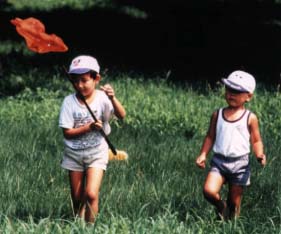ANNUAL CALENDAR August |
|
Homework over Summer Vacation
|
 Summer vacation for most elementary and middle schools in Japan lasts from July 21 to August 31. Although it's the longest vacation of the year--about 40 days--it's not all just fun for the kids. The Japanese school year begins in April, and summer vacation falls between the first and second terms. To make sure the students don't forget what they learned during the first term, teachers give out homework in various subjects. Some of the homework is also aimed at engaging students in activities that can't be done when school is in.
Summer vacation for most elementary and middle schools in Japan lasts from July 21 to August 31. Although it's the longest vacation of the year--about 40 days--it's not all just fun for the kids. The Japanese school year begins in April, and summer vacation falls between the first and second terms. To make sure the students don't forget what they learned during the first term, teachers give out homework in various subjects. Some of the homework is also aimed at engaging students in activities that can't be done when school is in.
Summer homework for elementary school students is simple--usually either a handicraft project (using such material as paper, wood, and clay) or a research report on a subject of the student's choice. Basically all middle schools give out homework in the five major subjects of Japanese, English, math, social studies, and science. The amount varies between schools, but it is usually enough to take several days if a student tries to do all of the homework at once. The following are some of the assignments given out at Keika Junior High School in Tokyo for summer 1998. For Japanese class, each student must write a report on a book of their choice. The science homework for seventh and eighth graders is to visit either a planetarium or science museum and report on it. For history class, eighth-grade students must write an article on a historical event of their choice as though they were actually there as newspaper reporters. All three grades are given workbook assignments for English and math. At another middle school in Tokyo one summer, an English teacher assigned his students the task of talking to an English-speaking foreigner they meet somewhere and handing in a report on the experience. Aside from writing about the conversation itself, the students were free to include other materials, such as photographs they took on the occasion or ticket stubs from the amusement park where they met the foreigner. The students enjoyed the assignment, the teacher recalls, since it resulted in fun and colorful reports that can be kept long after graduation. There are largely two types of students in the way they tackle their summer homework. The first type finishes the assignments early in the vacation, and spends the rest of the summer without worry; the second type enjoys the vacation to the fullest, then remembers about homework toward the end and panics. One teacher says that the second type is far more common than the first; perhaps that's why fewer children are seen playing outside around the end of August.
Photo: Some younger students catch insects and write reports about them. (Tokyo Metropolitan Government) |
APR | MAY | JUN | JUL | AUG | SEP | OCT | NOV | DEC | JAN | FEB | MAR |
 |